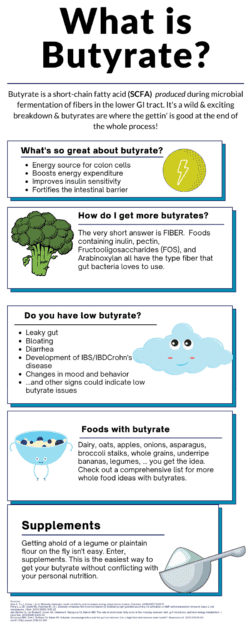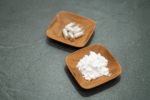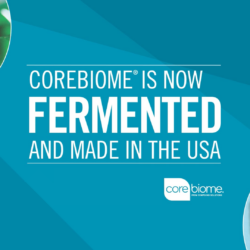Butyrate Postbiotics–What Are They and where can I find Them?

Wondering where to find butyrate postbiotics? When it comes to postbiotics, butyrate might be just what your body needs to get back on track. The human gut is fascinating because it tangibly impacts countless aspects of our lives, including mood, brain function, immunity, athletic performance, and even the appearance of your skin! In this article, we talk about postbiotics and how they’re at the center of gut health (and by extension human health and wellness) and the unique compound generated by the bacteria in our gut — butyrate. We’ll also tell you where you can find this important supplement.
At the heart of the gut is the microbiome — a universe of trillions of bacteria, viruses, and fungi that help digest our food, produce vitamins, regulate our immune system, and protect against other pathogens that cause poor health conditions.
Given the complexity and importance our gut health plays in overall health and wellness, it has become a burgeoning field of research over the past several years.
What Is Postbiotic Butyrate?

Learn more about 9 benefits of bioavailable butyrate.
Postbiotic Butyrate is a short-chain fatty acid (SCFA) produced via microbial fermentation of dietary fibers in the lower GI tract. Here’s a complete rundown on short chain fatty acids.
Research has shown that butyrate[1,2,3]:
- Serves as a major energy source for colon cells (colonocytes)
- Boosts energy expenditure by improving mitochondrial function
- Improves insulin sensitivity
- Fortifies the intestinal barrier (which may help protect against leaky gut)
Basically, butyrate is an important fuel for the cells in your gut, and it helps heal small holes in our gut lining so microbial ne’er-do-wells don’t enter the bloodstream and inflame the body. Learn more about postbiotic tributyrin and gut health now.
What is Butyrate Found In & Why Are Postbiotics Supplement Important?
Butyrate isn’t found in foods, per se.
Rather, we need to consume foods rich in certain types of fiber in order to give our gut bacteria the proper “raw materials” it needs to generate the ever-so-important SCFA.
Types of fiber used by gut bacteria to produce butyrate include:
- Resistant starch — produced when certain starches are cooked and then cooled (e.g. rice, potatoes, etc.). They are also found in unripe, green bananas and plantain flour
- Inulin — onion, garlic, artichoke, asparagus
- Pectin — apples, carrots, oranges, and apricots
- Fructooligosaccharides (FOS) — bananas, onions, garlic, and asparagus as well as various other fruits and vegetables
- Arabinoxylan — Found in cereal grains such as wheat, corn, rice, rye, oat, and barley
Despite the plethora of foods containing the right types of dietary fibers our gut bacteria can use to produce butyrate, many individuals are low in butyrate on account of not consuming enough vegetables each day.
For this reason, supplementation with a butyrate supplement is essential to health and wellness.
What Causes Low Butyrate Postbiotic levels?
By now, you may be wondering if you’re deficient in butyrate, or some tell-tale signs to look for if you might be low in butyrate?
For starters, the only way to know with a high-degree of certainty is by taking a stool test. Understandably, not everyone has the time, desire, or funds to take one.
However, if you’re not consuming enough plant foods (which contain fiber), there’s a good chance you may be low in butyrate. Diets which are high in fat and low in carbohydrates can also disrupt butyrate production. Don’t forget, there are other ways to get more butyrate and CoreBiome® is one of them.
Plus, when you factor in that the Standard American Diet is bloated with hyper-processed foods that are pitifully low in fiber, you begin to understand that the average individual likely isn’t getting enough butyrate and could use help from a postbiotic. Do you wonder why we even bother with short chain fatty acids? We explain here.
Signs of Low Butyrate
Another way to determine if you have low butyrate is to consider common symptoms of those who are deficient in the short-chain fatty acid.
Common signs in individuals who have low butyrate can include:
- Leaky gut
- Bloating
- Diarrhea
- Development of IBS/IBD
- Crohn’s
- Changes in mood and behavior
- Impaired protein and fatty acid metabolism
- Disrupted microbiome balance
- Increases in inflammatory markers
- Reduced insulin sensitivity
There are multiple ways to increase butyrate in the gut, including taking a Postbiotic, but there are other options to consider, as well.
How to Increase Butyrate in the Colon Using A Postbiotic
Sources of Butyrate
Butyrate (as well as other SCFAs) are produced during the fermentation of undigested dietary fiber, such as resistant starch and fructo-oligosaccharides (FOS).[4]
Since our bodies can’t digest fiber, it passes into the colon where the good bacteria feast on it, producing butyrate. (Quick: check out 9 benefits of butyrate!)
As we mentioned above, though, the average individual isn’t consuming enough fiber to produce sufficient amounts of butyrate each day, which is why they frequently look to gut health supplements, like a postbiotic. However, not all gut supplements are created equal and few actually contain bioavailable forms of butyrate (more on that in a bit).
That’s why it’s best to take a food-first approach to increasing butyrate production in the body and then adding in a high-quality butyrate supplement.
If you’re looking to increase butyrate in the colon, here are some foods to consider adding to your diet:
- Apples
- Onions
- Asparagus
- Broccoli
- Brussel sprouts
- Cauliflower
- Leafy greens
- Whole grains like sourdough bread
- Cold rolled oats (try soaking oats milk overnight for an easy-to-prep breakfast that nourishes and supports butyrate production!)
- Underripe (green) bananas
- Cooled brown rice
- Plantain or cassava flour
As we mentioned above, getting enough fiber in order to produce enough butyrate each day is possible through whole foods, but still 95% of us have trouble doing so on account of the hustle & bustle of jobs and family life, or availability of fresh vegetables.
In these instances, it may be beneficial to use a butyrate supplement. But not all butyrate supplements work! For example, those based on sodium butyrate don’t get to the colon (aka ‘large intestine’) where all good action happens.
If you’re a formulator, watch this:
Where to find postbiotics Supplements
CoreBiome® from Compound Solutions is the only postbiotic shown to deliver butyrate to the large intestine. In fact, CoreBiome® releases in both the small and large intestines to nourish the whole gut for optimal health and wellness. Look for CoreBiome® in these products:
- Gundry MD Bio Complete 3
- Mary Ruth’s Complete Gut Health+
- Primal Harvest Gut Restore
- Cutler Nutrition Pro-50
Learn more about the 9 Benefits of Bioavailable Butyrate:
9 Health benefits of Bioavailable Butyrate for gut, mind, body and more!
Complete Guide to Short-Chain Fatty-Acids
CoreBiome® the Source of Wellness
Gut health definitions: You should know these terms
References:
- Gao Z, Yin J, Zhang J, et al. Butyrate improves insulin sensitivity and increases energy expenditure in mice. Diabetes. 2009;58(7):1509-17.
- Peng L, Li ZR, Green RS, Holzman IR, Lin J. Butyrate enhances the intestinal barrier by facilitating tight junction assembly via activation of AMP-activated protein kinase in Caco-2 cell monolayers. J Nutr. 2009;139(9):1619-25.
- den Besten G, van Eunen K, Groen AK, Venema K, Reijngoud DJ, Bakker BM. The role of short-chain fatty acids in the interplay between diet, gut microbiota, and host energy metabolism. J Lipid Res. 2013;54(9):2325-40.
- Bourassa MW, Alim I, Bultman SJ, Ratan RR. Butyrate, neuroepigenetics and the gut microbiome: Can a high fiber diet improve brain health?. Neurosci Lett. 2016;625:56-63. doi:10.1016/j.neulet.2016.02.009






4 Comments
March 19, 2021 at 4:05 pm
Is a softgel form of tributirin still at the standardized 30% level of tributirin as the other products listed?
March 19, 2021 at 4:11 pm
Thanks for your question Rita. The softgel form is 90% tributyrin.
April 13, 2023 at 9:01 am
Hello,
Can postbiotics be taken during pregnancy?
Thanks!!
April 26, 2023 at 12:29 am
Hi there,
We do not have comprehensive information or studies on the effects of taking CoreBiome tributyrin while pregnant or breastfeeding and would recommend consulting with your healthcare provider.
-The Compound Solutions Team